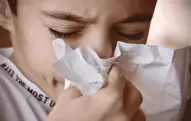Rising Cases of Rubella: Symptoms and Precautions
 Rubella, a common yet often underestimated viral infection, is experiencing a resurgence, posing significant risks, especially for pregnant women. Although primarily affecting children, rubella can lead to serious complications in certain cases. Understanding the symptoms and implementing preventive measures can help mitigate risks and curb the spread of the infection.
Rubella, a common yet often underestimated viral infection, is experiencing a resurgence, posing significant risks, especially for pregnant women. Although primarily affecting children, rubella can lead to serious complications in certain cases. Understanding the symptoms and implementing preventive measures can help mitigate risks and curb the spread of the infection.
Rubella is caused by Parvovirus B19, part of a family of viruses that typically infect animals like cats and dogs, though these strains do not affect humans. However, Parvovirus B19 specifically targets humans, causing a range of symptoms depending on the individual's age and health. A notable manifestation of this virus is Fifth disease (erythema infectiosum), characterized by a distinctive rash on the cheeks, predominantly affecting young children. In the United States, Parvovirus B19 infections are more prevalent from late winter to early summer, with smaller outbreaks occurring every three to four years.
Transmission, Symptoms, and Risks of Rubella
According to the Federal Center for Health Education's portal infection-protection.de, rubella spreads primarily through droplet infection or direct contact with an infected individual. Although there is no vaccine for rubella, basic hygiene practices, such as regular hand washing, can significantly reduce the risk of infection. For most individuals, rubella is self-limiting and does not require special treatment. However, pregnant women must exercise caution, as the infection can severely impact the unborn child.
Typical rubella symptoms include a red facial rash, fever, and flu-like symptoms similar to those of a coronavirus infection. The rash may later extend to the entire body, and adults might also experience joint pain.
Prevention and Treatment of Rubella
Protecting the health of pregnant women and their unborn children is paramount. Recognizing the symptoms and understanding the risks associated with rubella can help expectant mothers take necessary precautions and seek prompt medical advice if infected. Unlike rubella, there is no vaccine available for rubella. The Federal Ministry of Health's website, gesund.bund.de, recommends the following preventive measures:
- Avoid close contact with infected individuals.
- Do not share food or drinks.
- Refrain from sharing personal items or dishes.
- Wash hands regularly and thoroughly.
- Avoid touching the eyes, mouth, or nose.
Most rubella cases resolve without specific treatment, but pregnant women need to be particularly vigilant as the infection can harm the fetus. In severe instances, a blood transfusion might be required. Early recognition of symptoms and timely medical intervention are crucial.
Public Awareness and Preventive Measures
Staying informed about one's health status and undergoing regular preventive check-ups are advisable. Germany achieved rubella elimination status from the World Health Organization (WHO) in 2020. However, the first quarter of 2024 saw recurring reports of rubella cases, with 240 cases reported in March alone. Public awareness and comprehensive education are essential to ensure effective prevention and control of rubella.
It is imperative that the public remains informed about rubella to maintain high levels of awareness and preventative practices, ensuring the health and safety of all, particularly vulnerable populations such as pregnant women.
Image by Eszter Miller from Pixabay
Â










































